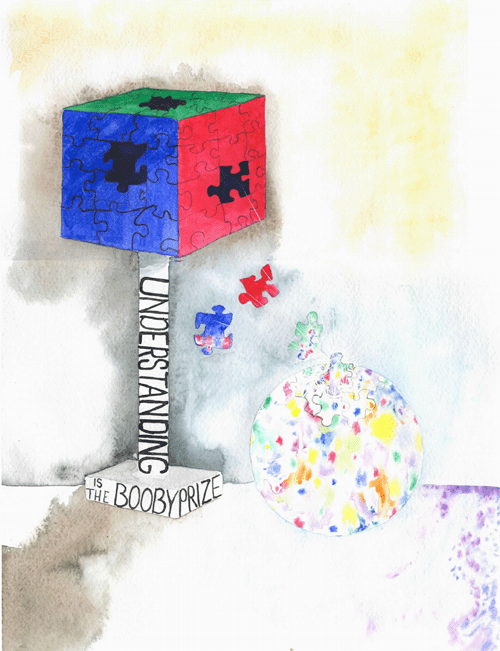Salut, mon cher ami René,
Our mutual friend Paul has been thinking lots about your words and encouraging others to do as well. I have to admit, I think he's on the right track in revisiting and rearranging those words of yours.
At first read, Paul's build-up followed by the assertion that "being and thinking are actually words for quite different things" left me cynical. My response was, "duh. So what? Being does not equal thinking. Why does this need clarification?". It is all because of your words, René, (and how they were subsequently over-interpreted), that we have slid effortlessly (and unconsciously?) from
I think, therefore I am to I think = I am and after a further sloppy extension to thinking = being. So, yes, we do need Paul's exposure of this invalid equation and his challenge of the unquestioned "truth" that "thinking is the end all and be all and to doubt that (people) are unless they think".
Without a denial of thinking = being, I would conclude that I am more tree than human, for I sense that I am "being" more when not thinking. My best "being" behavior is a result of "being" with: nature, another human, another interactive creature, paint, any thing I interact with. In fact, the more examples I recall from my personal experiences of "being", the more I'm inclined to believe thinking gets in the way of being.
The conscious filters this 'being' and is the source of the necessarily artificial explanation it creates of the world and our existence. The immediate result of thinking is less real being. As a result of my becoming more aware of what conscious thinking accomplishes, the thrill of thinking is, well if not gone, then for me, shaded by knowledge that it is an artifice. Thinking is for me now more of a fun game, a searching and sorting of patterns, a means to communication. But it definitely is not my way of being.
Because I happened to have just finished reading a book about an artificial intelligence (Galatea 2.2), a created 'thinker', I couldn't help but attempt to link the outcome of the book to Paul's ideas written to you. The 'thinker', named Helen, appeared to be able to think, as she made connections over her vast network of 'data' accumulated and housed in her 'brain', a large assembly of multiple computers. The story convincingly illustrates Helen's thinking, and poses provocative questions as to whether or not she is conscious. Nowhere in the book is the issue raised of whether she is, is 'being', as I understand it.
So based on my experience, I agree with Paul: being necessarily comes first, thinking second. 'And when we do think, it's necessarily in ways that are rooted in how we are when we're not thinking.' Maybe thinking is subservient to being. Thinking allows us to change, to make more advantageous choices (not universally better, just better for us) to allow a better being. This is what Paul suggests: "I am, and I can think, therefore I can change who I am".
"cogito ergo sum" ...
No doubt you could not to foresee where the unilateral emphasis on thinking, whose outcome Paul described as "to encourage people to put unreasonable levels of trust in 'thinking', to believe that thinking is the end all and be all and to doubt that they are unless they think", would take the human race. I couldn't agree more that it's time to dethrone thinking - or elevate other means of knowing - to allow for, and to value, a multiplicity of ways into being.
So I'll offer instead a phrase whose usefulness has not yet failed me:
μηδεν αγαν
(medan agan; "nothing in excess", the Golden Mean in Greek thought)
a famous motto inscribed at the Temple at Delphi. Maybe the Greeks had it right all along.
Sois sage.
Sharon
 Dear René,
Dear René,
Sharon sent me a copy of her letter to you, and I thought I'd fill in a little background. Sharon is, among other things, a chemist and a painter. The image to the right is one she painted several years ago, when Sharon and I first started talking about the kinds of issues raised in my earlier letter to you.
Among the interesting things about the image is that some people see the puzzle pieces falling from the cube to the sphere, others see them rising from the sphere to the cube, and still others see them going both ways, sometimes one and sometimes the other. If one imagines the cube to be "thinking" and the sphere "treeness", then peoples' differing reactions to the picture may say a lot about the matters at hand.
In Sharon's original conception, the puzzle pieces are falling, and the image as a whole is a celebration of moving from a more formal, more constrained state of mind ("thinking"?) to a more fluid and more integrated state of mind ("treeness"?). Those seeing movement in the opposite direction might be those for whom there is more appeal in finding patterns and order.
Sharon, as you can probably tell from her letter, is suspicious of the direction of movement toward "thinking". It is, in her experience, "an artifice", "less real" and "gets in the way of being". Accordingly, Sharon likes and endorses part of my original message to you: "its time to dethrone thinking - or elevate other ways of knowing - to allow for, and to value, a multiplicity of ways into being".
Sharon's argument is an important one for you to hear and I endorse it in turn. But her letter focuses mostly on half the argument I was making. I think, though, that the other half is at least equally important and needs some help from you here. For me, the puzzle pieces happily and productively go in both directions: it is treeness that feeds thinking and thinking, in turn, that feeds treeness. Neither, I would argue, is "less real", and just as "thinking" can (undesirably) get in the way of "treeness", so too can "treeness" get (equally undesirably) in the way of "thinking". But neither of necessity gets in the way of the other; instead they can both be regarded as mutually supportive. From this perspective, I would equate Sharon's "being" not with treeness but rather with the current product of the ongoing exchange between treeness and thinking.
My guess is that Sharon's tendency to equate "being" with "treeness", and to downgrade the usefulness of "thinking", has to do with your struggle to provide a foundation for "skeptical inquiry", the dualism you hit on for this purpose, and the subsequent valorization of "thinking" (to the deteriment of other contributions to "being") by others. I'll bet Sharon would be more comfortable with the idea that thinking (like treeness) is a valuable part of being if you told her that for you, like for others, the issue is actually "becoming" and so you too would today have been an advocate of redressing the current imbalance between "thinking" and appreciating the "multiplicity of ways into being". One can "become" without thinking, but thinking (properly used) certainly helps to facilitate the process.
I suspect you are not in a state in which you can convey this message directly. Maybe you have some indirect ways to do so though. Whatever help you can provide along these lines will be much appreciated.
Paul
For more from Sharon, see Being versus Becoming.
| Writing Descartes Home Page
| Descartes Forum
| Science in Culture
| Serendip Home |
Send us your comments at Serendip

© by Serendip 1994-
- Last Modified:
Wednesday, 02-May-2018 10:51:53 CDT

 Dear René,
Dear René,